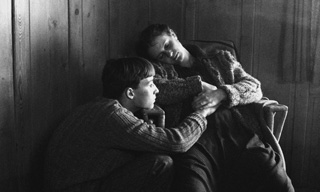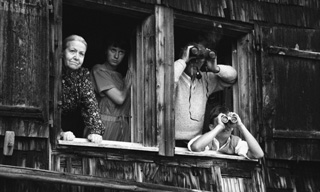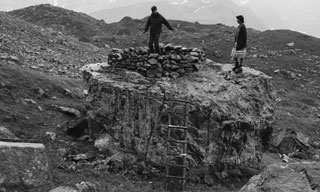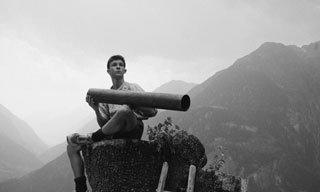Alpine Fire
Höhenfeuer- SWITZERLAND / 1985 / Swiss-German / Color / 35mm / 117 min
Director, Script: Fredi M. Murer
Photography: Pio Corradi
Editing: Helena Gerber
Sound: Florian Eidenbenz



Music: Mario Beretta
Art Directors: Bernhard Sauter, Edith Peyer
Costume: Greta Roderer
Cast: Thomas Nock, Johanna Lier, Rolf Illig, Dorothea Moritz, Jörg Odermatt, Tilli Breidenbach
Production Company, World Sales: Bernhard Lang AG
Source: National Film Center, The National Museum of Modern Art, Tokyo
This film follows a family of four who have no access to water or electricity, and who make their living mostly through subsistence farming. Other than the shopping trips the father makes down the mountain, the family has no direct communication with anyone at all except each other, save perhaps a wave through the telescope at grandparents living across the valley. The deaf-mute son is in his late teens. He grows up peacefully alongside his sister, who has given up on being a teacher, although he doesn’t hide his impatience at being disabled. One day he becomes exasperated with a lawnmower that has broken down and throws it away, which angers his father. The sister brings food to her brother in the mountain hut where he lives alone. They enjoy time together huddled around a campfire on the peak of the mountain, but his sister’s eventual pregnancy later comes to light . . .
Alpine Fire is Murer’s second feature-length film, produced six years after the box-office failure of Zones. It won the Golden Leopard at the 1985 Locarno International Film Festival, securing Murer’s global reputation. Like We Mountain People in the Mountains, this film is set in the mountainous Swiss canton of Uri, and depicts the mythical world of an isolated mountain-dwelling family and the tragedy that befalls them.
Yoshimoto Takaaki described this film, with its focus on family in the midst of a beautiful yet harsh natural world, as a “film of the slope.” When we consider that the protagonist is a boy who is robbed of his ability to hear or speak from birth, we begin to see a consistent theme emerge throughout Murer’s oeuvre. Murer touches the outside world through the visual and the auditory. By making use of devices such as telescopes, magnifying glasses, and mirrors, his films make manifest the act of seeing itself.
On the other hand, the silence experienced by the deaf brother is emphasized by the transistor radio, the sound of the watch and the bells, and footsteps. By questioning the seemingly self-evident idea that sight and sound are a given part of the body, Murer’s films open our sensory organs to the other, bringing richness to the world around us. After this, how do our bodies take in the rumbling of the earth created by the avalanche at the end of the film?
* Please also see “Resonant Bodies—Fredi M. Murer Retrospective”
 Fredi M. Murer
Fredi M. Murer
Born in 1940 in Beckenried, in the canton of Nidwalden, Switzerland, Murer began studying design and photography at the School of Art and Design in Zurich in 1959. He shot an 8 mm short film called Marcel in 1962, and designed and directed a large-scale slide show at the Swiss Expo 64 in Lausanne. Murer completed the medium-length film Pacific—or the Contented (1965) and an experimental documentary, Chicory (1966), which was awarded the International Jury Prize at the International Short Film Festival Oberhausen. Films that followed—Bernhard Luginbühl (1966), Sad-is-Fiction (1969), and Passages (1972) —were all documentaries about artists. Having shot Vision of a Blind Man (1969), he briefly moved to England to teach at an art school. On his return, Murer directed the science fiction Swiss Made 2069 as a part of omnibus. While working on Christopher & Alexander, which was commissioned by a banker, he shot his own documentary, We Mountain People in the Mountains (1974), which received the International Critics Award at the Locarno International Film Festival. This film later becomes a part of the so-called “mountain trilogy” along with Alpine Fire (1985) and The Green Mountain (1990). His first narrative film, Zones (1979), however, was a box office failure. Murer received international recognition for Alpine Fire, which was awarded the Golden Leopard Prize and the Ecumenical Prize at the Locarno International Film Festival. This film was shown around the world and prompted him to visit Japan. His later works Full Moon (1998) and Vitus (2006) were both shown in Japan. Murer announced his retirement in 2014 after releasing a narrative film, Love and Chance (Liebe und Zufall).
